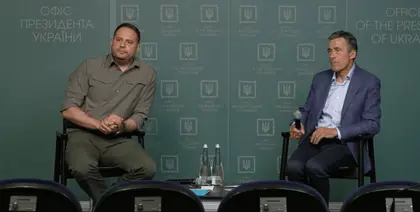One way to understand the Kyiv Security Compact, a dense document recently signed by former NATO Secretary General Anders Fogh Rasmussen and Ukrainian Presidential Head Andrii Yermak, is to think of it as a laundry list of all the things NATO member states and their allies wished they had done to help Ukraine before Russia invaded, but didn’t, and now they say they intend to, without being very specific.
The Compact proposes in general, aspirational terms, that countries already providing Ukraine assistance in its war against Russia will prevent a repeat invasion by arming Ukraine to the teeth and pumping financial and social support into the country, probably for decades. Also, if Russia gets out of line again, always assuming things work as planned, punishing sanctions will trigger automatically.
JOIN US ON TELEGRAM
Follow our coverage of the war on the @Kyivpost_official.
The joint declaration commits neither Ukraine nor NATO to any policy. But, if put into full effect, Yermak and Rasmussen’s proposals will doubtless cost taxpayers (not Ukrainian) tens of billions of dollars. The heart of the Compact is a plan for a long-term, multilateral effort to turn the Armed Forces of Ukraine (AFU) into a military bigger, more heavily armed and by some standards more capable than the Israeli Defense Forces.
This munificent weapons and training stream would however come with the condition – multiple declarations of international solidarity with Ukraine notwithstanding – that, if war comes to Ukraine again, Ukrainians, and no one else, would actually shed blood in Ukraine’s defense.
Yermak and Rasmussen (and their staffs) declare the 1994 Budapest Memorandum (in which, among other commitments, Russia promised to respect Ukrainian territorial integrity in exchange for Ukraine giving up its nuclear weapons) as “worthless.” They say Ukraine needs new international security guarantees, the key one being long-term international support for the Ukrainian military and state, so the AFU can credibly deter Russian invasion and defeat it if it takes place. This is called a “significant defensive force” capable of repelling the “Russian Federation’s armed forces and paramilitaries.”
The document says nothing about how many tanks, planes, artillery pieces or shells this might be, nor does it spell out the desired size of the Ukrainian army, or which country’s taxpayers would cough up what sums, over what time frame, to turn that build-up into a reality.
A potentially bigger omission in the document might be nuclear weapons. In 1994 Ukraine signed the Budapest Memorandum, rejecting nuclear weapons in exchange for other signatories’, including Russia’s, promise to respect Ukraine’s borders. Paragraph Two of the Compact’s preamble states: “The Budapest Memorandum on Security Assurances proved worthless.”
At least theoretically, Rasmussen and Yermak’s signatures on the Compact could be construed as tacit agreement by both officials that Ukraine has abrogated the Budapest Memorandum, or intends to, and so reserves the right to (re)create a nuclear arsenal. It is hard to see how the Kremlin would not interpret a senior Ukrainian official’s rejection, in writing, of the Budapest Memorandum in any other light than a Kyiv first step (back) toward nuclear weapons. The word “nuclear” does not, however, appear in the Compact.
In terms of conventional weapons and other support, according to the Compact, nations wanting to help Ukraine would sign bilateral agreements delivering aid not just in wartime, but continually, going forward into the future. The bilateral agreements “should explicitly commit guarantors to Ukraine’s self-defense,” the Compact says. What an explicit commitment might look like, and who decides whether the commitment is really a commitment, is not explained.
The end goals of the raft of bilateral agreements Ukraine would sign to guarantee its security are spelled out a bit more clearly: an army fully capable of turning back a major Russian ground invasion, a “massive training and joint manoeuvre programme” to create and maintain AFU combat readiness, advanced defensive systems – primarily anti-aircraft – on-the-ground and operational in Ukraine, “access” to EU capacity-building funding, and an effective (meaning properly financed and organized) territorial defense force for all civilians aged 18 and over.
Countries that “could” sign bilateral agreements with Ukraine to “guarantee security” include, the agreement said, primarily members of the Ukraine Defense Contract Group (“the US, UK, Canada, Poland, Italy, Germany, France, Australia, Turkey, and Nordic, Baltic, Central and Eastern European countries”), whose representatives have met monthly in Ramstein Germany to discuss assistance to Ukraine since shortly after the war began. Japan and South Korea might potentially provide “non-military guarantees,” and regional agreements to help deter Russia from attacking Ukraine could, the Compact said, be signed with Turkey, Romania, Bulgaria and other Black Sea states.
The Compact leaves murky which country would provide what guarantee, and by what measure. Taken together, all the bilateral agreements would constitute “iron-clad” Ukrainian security.
You can also highlight the text and press Ctrl + Enter



